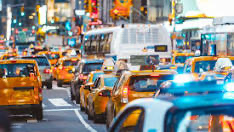
The first congestion pricing charge scheme for motor vehicles in the United States has been enacted in New York City.
New York City has officially launched the first congestion pricing scheme in the U.S., a landmark move to tackle the city's severe traffic congestion while generating revenue for its public transportation system. The scheme imposes daily fees on vehicles entering a designated congestion zone located south of Central Park, which includes iconic areas like Times Square, the Empire State Building, and Wall Street.
The pricing structure varies, with car drivers facing a charge of up to $9 per day, while other vehicles may incur different rates depending on factors like weight and size. The goal is twofold: to reduce traffic in the busiest parts of Manhattan, thereby easing congestion, and to raise funds—potentially billions of dollars—to invest in upgrading and maintaining the city's public transit infrastructure, including subways and buses.
While the initiative has received support for its potential to improve air quality and reduce gridlock, it has also faced significant opposition. Critics argue that the charges disproportionately affect residents of outer boroughs and people who rely on cars for daily commuting, particularly in communities with limited public transportation options. There are also concerns about how the funds will be spent and whether the congestion pricing will effectively alleviate the city's traffic woes.
This step represents a bold experiment in urban transportation policy, and its success or failure could have ripple effects on other U.S. cities grappling with similar issues.
https://www.cbsnews.com/newyork/news/nyc-congestion-pricing-monday-comm…


